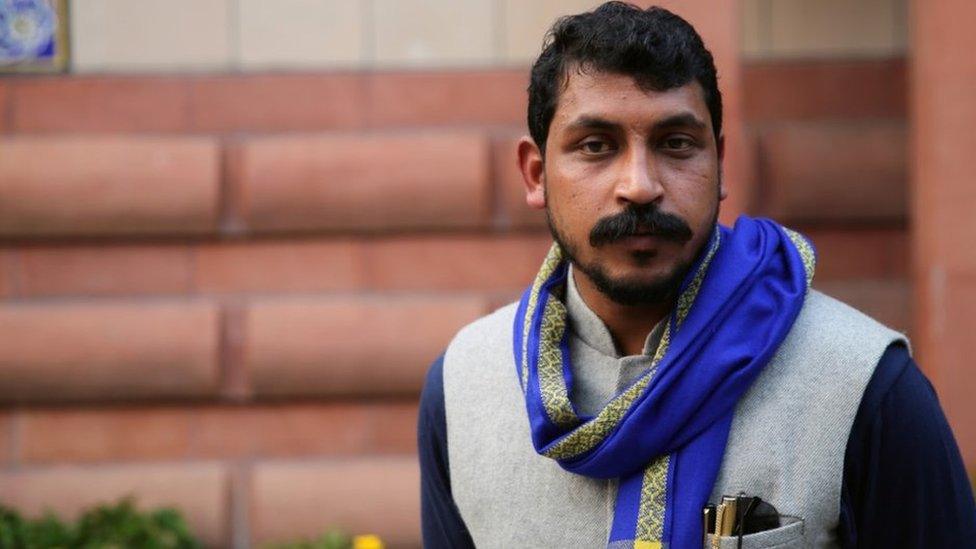India election 2019: 15-19 April the week that was
- Published
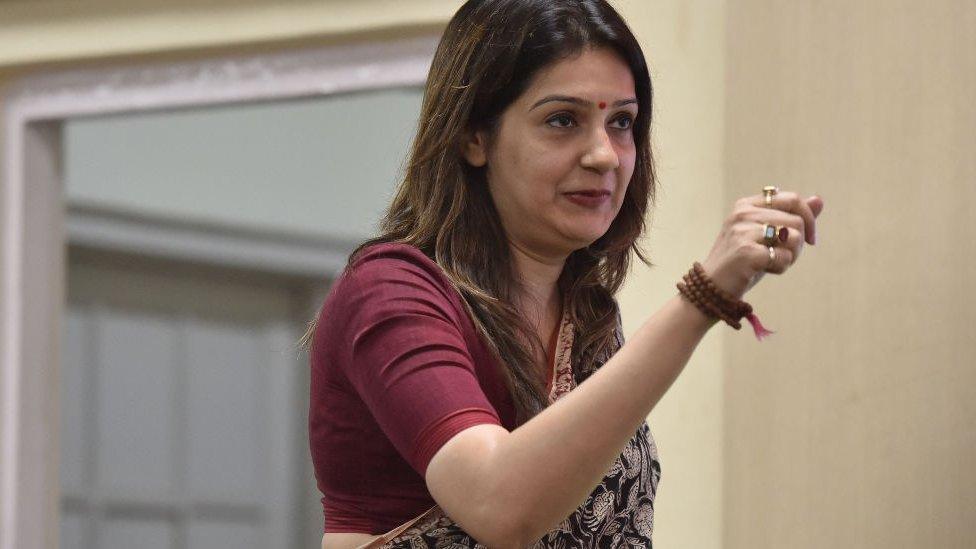
India has entered full election mode: voting began on 11 April, and the final ballot will be cast more than five weeks later on 19 May. Every day, the BBC will be bringing you all the latest updates on the twists and turns of the world's largest democracy.
On Friday, a Congress spokesperson quit over harassment
What happened?
Priyanka Chaturvedi, a spokesperson for India's main opposition Congress, resigned from the party.
Her decision comes two days after she tweeted her anger with a party decision to reinstate some workers who she alleged had "misbehaved" with her during a press conference in the northern town of Matura.
Allow X content?
This article contains content provided by X. We ask for your permission before anything is loaded, as they may be using cookies and other technologies. You may want to read X’s cookie policy, external and privacy policy, external before accepting. To view this content choose ‘accept and continue’.
Ms Chaturvedi has been one of the most vocal and social media savvy voices of the Congress, often targeting the ruling Bharatiya Janata Party (BJP) and Prime Minister Narendra Modi.
She later joined the regional Shiv Sena party, an ally of the ruling Bharatiya Janata Party.
"The Congress let me down. I felt the need to stand up for what I felt I was right," she said in a press conference in Mumbai.
Why does this matter?
Ms Chaturvedi's resignation is undoubtedly an embarrassment for the Congress, and her decision to join the Shiv Sena, if true, marks a complete about turn in her political career.
In her resignation letter, which she tweeted out a short while ago, Ms Chaturvedi said she was saddened that "despite the safety, dignity, empowerment of women being promoted by the party", this was not "reflected in the action of some members".
Allow X content?
This article contains content provided by X. We ask for your permission before anything is loaded, as they may be using cookies and other technologies. You may want to read X’s cookie policy, external and privacy policy, external before accepting. To view this content choose ‘accept and continue’.

The news has already been met with criticism on Twitter, with many saying that it is a shame that the party has allowed such a situation to even take place.
Allow X content?
This article contains content provided by X. We ask for your permission before anything is loaded, as they may be using cookies and other technologies. You may want to read X’s cookie policy, external and privacy policy, external before accepting. To view this content choose ‘accept and continue’.
According to news reports, Ms Chaturvedi had filed an internal complaint against several party workers based on which they were suspended from the party. However, they were reinstated a few days later, reportedly on the insistence of a senior party leader.
Although she has not yet confirmed the news about joining the Shiv Sena, it has caused a sensation on Twitter and she is among the top five trends in India.

India's richest man endorses Congress party candidate
What happened?
Mukesh Ambani, India's richest man, created quite a buzz by endorsing Congress candidate Milind Deora.
His support was declared in a video tweeted by Mr Deora, a former MP, close to midnight on Wednesday. But it started getting attention only towards the end of Thursday after the second phase of voting had ended.
"Milind is the man for south Mumbai," Mr Ambani declared in the video titled "Jobs".
Allow X content?
This article contains content provided by X. We ask for your permission before anything is loaded, as they may be using cookies and other technologies. You may want to read X’s cookie policy, external and privacy policy, external before accepting. To view this content choose ‘accept and continue’.
Mr Ambani is one of several people in the video, which includes local businessmen, small shopkeepers and even Uday Kotak, a billionaire banker.
Why does this matter?
Although Mr Kotak has also endorsed Mr Deora, it's Mr Ambani's support that is attracting more attention because of another reason.
His younger brother, Anil Ambani, has in recent months been persistently attacked by Congress, external for his role in a multi-billion fighter jet deal that has come under suspicion. The allegation is that Prime Minister Narendra Modi signed a deal that favoured Anil Ambani - a charge both men have vehemently denied.
The brothers have had a rocky relationship over the years. They fought over their father's businesses after he died in 2002 without a will - this included bruising court battles over natural gas interests.
But Mukesh Ambani helped Anil pay a debt of 5.5bn rupees ($80m; £60m) to telecoms giant Ericsson in March, saving him from spending time in prison.
Anil Ambani had failed to meet a court deadline to make the payment.
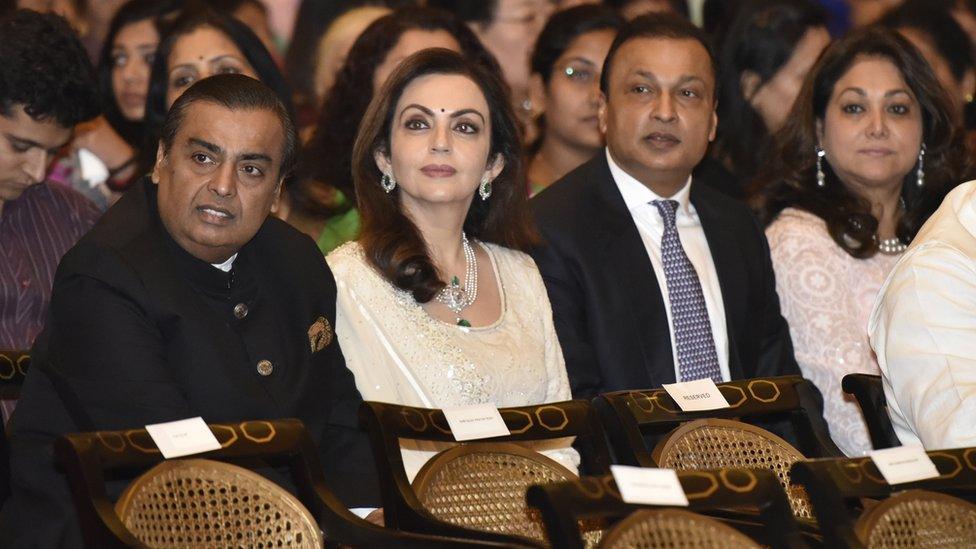
Mukesh Ambani, left, sits next to his wife Nita Ambani, and Anil Ambani on the right
Mukesh Ambani is worth more than $54bn, while Anil has an has an estimated net worth of around $300m, according to Bloomberg.
Mr Deora won South Mumbai , one of the richest constituencies in India, in 2004 and 2009. He is now running to unseat Arvind Sawant from Shiv Sena, a strong regional party and ally of the governing Bharatiya Janata Party (BJP).

On Thursday, the flying shoe returned to India politics
What happened?
A man hurled a shoe at a leader from the governing Bharatiya Janata Party (BJP) during a press briefing at the party's headquarters in Delhi.
The shoe was thrown as GVL Narsimha Rao whil he and other leaders were addressing the media on their decision to field Sadhvi Pragya, who is accused of involvement in a 2008 blast that killed seven people and injured 100 others, as a candidate.
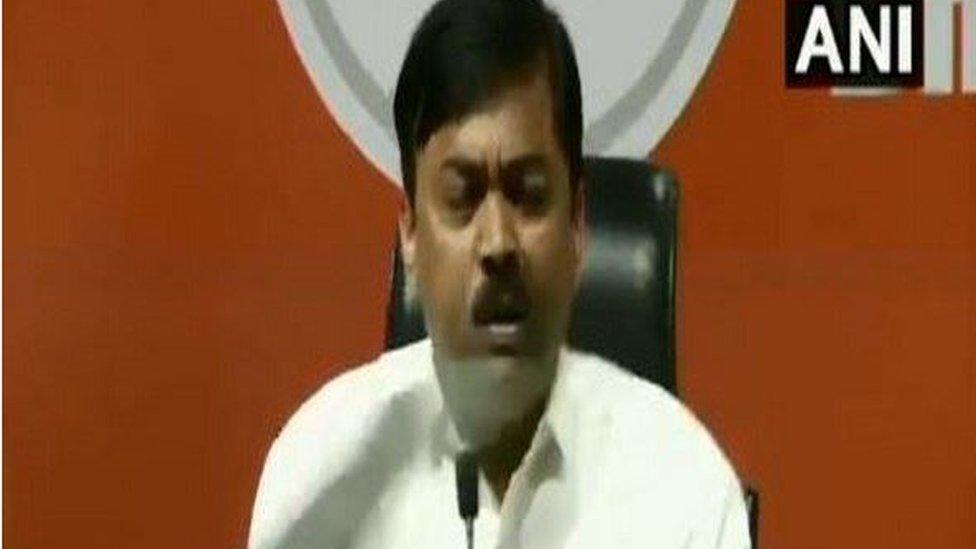
GVL Rao was addressing the press when a man hurled a shoe at him
The motives of the shoe-thrower remain unclear. But Mr Rao has condemned the incident, saying it was "yet another attempt" by the main opposition Congress party to undermine the BJP.
The unidentified man was immediately rushed out of the BJP's office by security.
Why does this matter?
No Indian election is complete without a shoe-hurling incident - and we've just experienced the first one in this year's general election.
The country's first "shoegate" happened in 2009 when a journalist flung a shoe at the home minister at the time, P Chidambaram.
Jarnail Singh, a journalist working for a local daily newspaper, was apparently not satisfied with Mr Chidambaram's answers regarding an accused in the 1984 anti-Sikh riots, which left early 3,000 people dead.
"It did not hurt him. It was just a symbolic protest," Mr Singh told media at the time.
It's not uncommon for Indian politicians to have ink, eggs and shoes thrown at them by irate protesters. Delhi Chief Minister Arvind Kejriwal is one politician who has been singled out for such attacks..
He has even been slapped at a public rally and once tweeted: "I am just thinking - why am i being repeatedly attacked? Who r the masterminds? What do they want? What do they achieve?"

Official suspended for checking PM's helicopter
What happened?
News that a poll official was suspended on Tuesday for inspecting a helicopter used by Prime Minister Narendra Modi for campaigning surfaced on Thursday.
Mohammed Mohsin, who reportedly led a team that inspected papers on the chopper in the eastern state of Odisha, was suspended by India's Election Commission.
It said the official had breached its rules for people with the highest security clearance, such as the prime minister, former primer ministers and other important leaders. In a statement, the commission said that these individuals were exempt from such checks.
The prime minister was held up for 15 minutes because of "the sudden checking", external, an official told local media.
Why does this matter?
This is the second time in a week that a helicopter used by Mr Modi has been in the news.
The main opposition Congress had earlier asked the commission to investigate a "mysterious box" that was transported from Mr Modi's helicopter to a private car while he was campaigning in the southern state of Karnataka.
The party alleged that this box may have contained cash - a claim that the BJP has dismissed.
Indian elections are notorious for the use of cash to bribe voters - and police checks on private cars and politicians' vehicles are common ahead of and during polls.
Now Congress has brought up the Karnataka "box" again in light of Mr Mohsin's suspension, accusing the commission of "bias".
Allow X content?
This article contains content provided by X. We ask for your permission before anything is loaded, as they may be using cookies and other technologies. You may want to read X’s cookie policy, external and privacy policy, external before accepting. To view this content choose ‘accept and continue’.


On Wednesday, BJP fielded a candidate accused in terror blasts
What happened?
Sadhvi Pragya, an accused in a 2008 blast that killed seven people and injured 100 others, was given a ticket for the general elections from India's ruling Bharatiya Janata Party.
The Malegaon blasts, as they are widely known, saw two bombs fitted on a motorcycle explode in Malegaon, a Muslim majority town, in the western state of Maharashtra.
Sadhvi Pragya has been accused of conspiracy in the blasts.
"I have formally joined the BJP. I will contest elections and will definitely win. It won't be difficult for me," she told reporters.
Her candidature from Bhopal, the capital city of the central state of Madhya Pradesh, has caused an uproar in the country.
Why is this important?
Sadhvi Pragya, a female Hindu priest, has made no secret of what her poll plank is going to be.
Soon after her candidature was announced, she told reporters that she was ready for a dharma yuddh or religious war.
Madhya Pradesh is one of the states where the BJP lost the assembly elections to the opposition Congress party in 2018. With this choice of candidate, it looks as though they are banking on religious polarisation to consolidate the Hindu vote.
The news has been met with outrage, including from the former chief minister of Jammu and Kashmir, Mehbooba Mufti, who asked what the response would be if the shoe was on the other foot:
Allow X content?
This article contains content provided by X. We ask for your permission before anything is loaded, as they may be using cookies and other technologies. You may want to read X’s cookie policy, external and privacy policy, external before accepting. To view this content choose ‘accept and continue’.


Vellore polls cancelled over bribery charges
What happened?
India's Election Commission has called off voting in Vellore in the southern state of Tamil Nadu after officials allegedly found cash and other evidence suggesting that one of the candidates was bribing voters.
Vellore was scheduled to go the polls along with the state's 38 other parliamentary seats on Thursday. It has around 1.4 million registered voters.
The candidate - Kathir Anand - is a member of the Dravida Munnetra Kazhagam (DMK), a regional party and the main opposition in the state.
Mr Anand has already asked the commission to revoke the order, alleging that the entire operation was "stage-managed" by the governing party, All India Anna Dravida Munnetra Kazhagam (AIADMK).
Why is this important?
While analysts and observers widely believe that bribing voters - with cash, liquor or freebies - is common during Indian elections, polls have rarely been cancelled because evidence is often hard to come by.
In this case officials say they found 11 crore rupees ($1.5m; £1.2m) at the home of a man whose brother-in-law works for DMK. They also found documents detailing the break-up of voters across the constituency and how the money would be distributed.
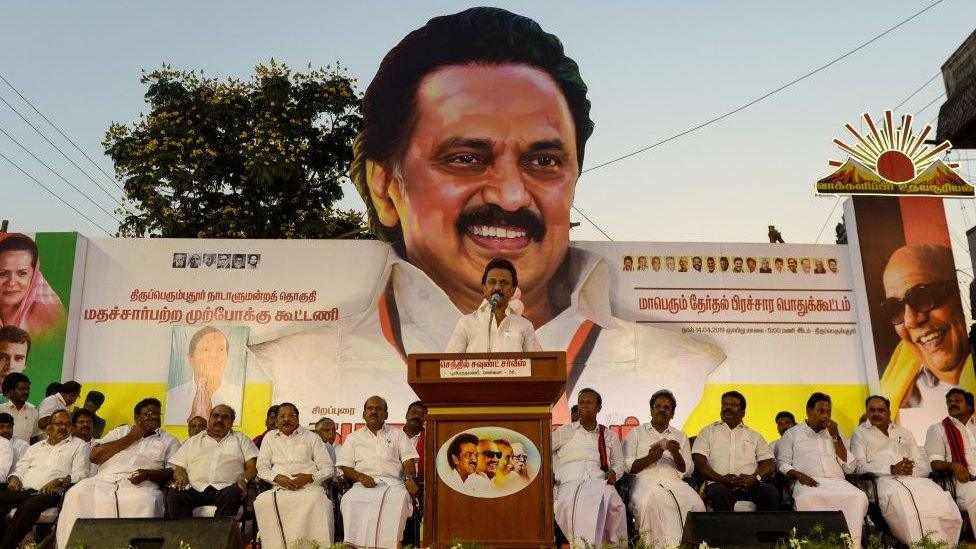
MK Stalin is the DMK's candidate for chief minister of Tamil Nadu
The party worker has since confessed that the cash belonged to him and that it was "meant to influence voters in favour of" Mr Anand, the Election Commission said in a statement.
They were able to trace the money to Mr Anand based on an earlier search of his home and a college his family runs.
Research suggests that bribes don't actually win votes in India, but that doesn't seem to stop political parties from trying anyway.
But this is certainly a blow to DMK, which is contesting its first election since the death of Muthuvel Karunanidhi, a party veteran and one of India's most iconic politicians.
And the announcement came on Tuesday evening, around the same time news broke that the house of another DMK leader, Kanimozhi, was raided by income tax officials for unaccounted cash. They later said they had received a "false tip".

On Tuesday, the Supreme Court upheld the campaign ban on Mayawati
What happened?
India's top court upheld Monday's decision by the Election Commission to temporarily ban Dalit leader Mayawati from campaigning for 48 hours after she violated election guidelines.
Ms Mayawati appealed against the decision in the Supreme Court on Tuesday.
Why is this important?
The commission's decision is a setback for Ms Mayawati, who is seen as a regional heavyweight in the crucial state of Uttar Pradesh. It also comes at an important time as some constituencies in the state head to the polls on Thursday in the second phase of voting.
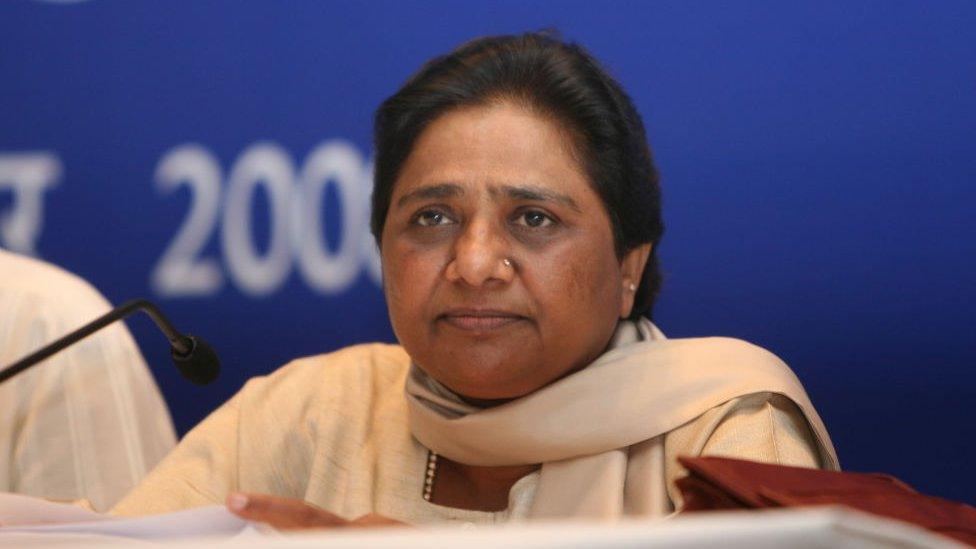
Mayawati appealed against the temporary ban on Tuesday
On Monday, she was reprimanded for cautioning Muslims against splitting their vote - she urged them to vote against the governing Bharatiya Janata Party (BJP) and to vote for her party and its allies.
The state's chief minister, Yogi Adityanath, was also pulled up on Monday for two different remarks against Muslims. He made both of the comments during rallies leading up to the first phase of voting on 11 April.
The remarks by both leaders violate election guidelines because they are polarising and appeal to voters on the basis of identity.

A public spat over a potential alliance in Delhi
What happened?
Rahul Gandhi, the president of India's main opposition Congress party, and Arvind Kejriwal, the chief minister of Delhi, who heads the Aam Aadmi Party (AAP) have been unable to agree on a seat sharing agreement, ahead of polls in Delhi - and the spat has spilled on to Twitter.
Delhi has seven seats in the Lok Sabha or lower house of parliament - The Congress had said it would give AAP four seats and contest in just three. But AAP, which runs Delhi's local government is insisting on contesting in 5 seats.
In a tweet, Mr Gandhi accused Mr Kejriwal, of "taking a U-turn" on talks of an alliance.
Allow X content?
This article contains content provided by X. We ask for your permission before anything is loaded, as they may be using cookies and other technologies. You may want to read X’s cookie policy, external and privacy policy, external before accepting. To view this content choose ‘accept and continue’.
Mr Kejriwal hit back at Mr Gandhi, saying that talks were still going on. "Your tweet shows that an alliance is not by desire but only a pretension. I am pained that you are giving mere statements," he wrote on Twitter in Hindi.
Why is this important?
This is the latest Congress pre-poll alliance that seems to breaking down, which should be of great concern for India's "grand old party".
Apart from a few states such as Bihar and Tamil Nadu, the party, which has ruled India for 49 years, has struggled to stitch together pre-poll alliances with crucial regional parties in many states.
In Uttar Pradesh, the country's most populous state which sends the highest number of MPs to parliament, the party was left out of a "grand alliance" of regional parties, who banded together to take on the dominance of the ruling Bharatiya Janata Party (BJP). This latest fiasco in Delhi is not helping it either.
Writing in The Wire website, reporter Ajoy Ashirwad Mahaprashasta says that the party has also had "a hard time retaining its old partners", external.
For example, the party was shaken when Sujay Vikhe Patil, the son of a stalwart Congress leader, joined the BJP in Maharashtra.
The Reuters news agency quoted political analysts as saying that although Rahul Gandhi has been willing to bend to regional party demands, he has been undermined by Congress leaders' unwillingness to compromise or play second fiddle to these outfits.
Allow X content?
This article contains content provided by X. We ask for your permission before anything is loaded, as they may be using cookies and other technologies. You may want to read X’s cookie policy, external and privacy policy, external before accepting. To view this content choose ‘accept and continue’.
Analysts say this failure to forge key pre-poll alliances will only help bolster the BJP and its Hindu nationalist agenda.
"The 2019 battle is not to save Gandhi family or Congress party, the battle is to save India and its future," Shahid Siddique, editor of a Urdu language weekly newspaper, told Reuters.

On Monday, we saw a row over underwear and two regional leaders banned
What happened?
India's Election Commission temporarily banned Uttar Pradesh chief minister Yogi Adityanath and Dalit leader Mayawati from campaigning for violating election guidelines.
Mr Adityanath, a senior politician from the ruling BJP, cannot address any public meetings or rallies, and cannot even speak to the media for 72 hours starting from 06:00 local time on Tuesdat. The same applies to Ms Mayawati, president of the regional Bahujan Samaj Party (BSP), but her ban ends in 48 hours.
Why does this matter?
Ms Mayawati was pulled up for cautioning Muslims against splitting their vote - she urged them to vote against the BJP and for her party and its allies.
And Mr Adityanath has been reprimanded for two different remarks against Muslims, both made during rallies leading up to the first phase of voting on 11 April.
In one speech he had said the main opposition Congress party was infected with a "green virus", a reference to Muslims. In another speech, he said, "If you have faith in Ali, we have faith in Bajrang bali". The provocative remark plays on the religious differences between Muslims (Ali is the son-in-law of Prophet Muhammad) and Hindus (Bajrang bali is another name for the Hindu god, Hanuman).
The remarks by both leaders violate election guidelines because they are polarising and appeal to voters on the basis of identity.
Mr Adityanath, a Hindu hardliner, has repeatedly made controversial remarks, especially against Muslims. And the action against him comes on the heels of the Supreme Court asking the Election Commission what is was doing to curb violations
This commission's decision is also a setback for Ms Mayawati and Mr Adityanath ahead of the second phase of voting in Uttar Pradesh on Thursday.
Both leaders are regional heavyweights in what is a crucial state for any party looking to win a majority at the centre - it sends 80 MPs to parliament.

'He shouldn't be allowed to contest elections'
What happened?
Indian politician Jaya Prada hit back at Azam Khan, a sitting lawmaker, for allegedly making a remark about her underwear.
"I am a woman and I can't even repeat what he said. I don't know what I did to him that he is saying such things," she told ANI news agency.
Allow X content?
This article contains content provided by X. We ask for your permission before anything is loaded, as they may be using cookies and other technologies. You may want to read X’s cookie policy, external and privacy policy, external before accepting. To view this content choose ‘accept and continue’.

In a video that was shared widely, Mr Khan was heard saying that the politician wore "khaki" underwear - a reference to the brown shorts worn by members of the rightwing Rashtriya Swayamsevak Sangh (RSS), the ideological fountainhead of the governing Bharatiya Janata Party (BJP).
Although Mr Khan did not name anyone, his comments have been widely interpreted as a reference to Jaya Prada, a former actress, who is contesting on a BJP ticket from Rampur in the northern Uttar Pradesh state - and directly taking on Mr Khan.
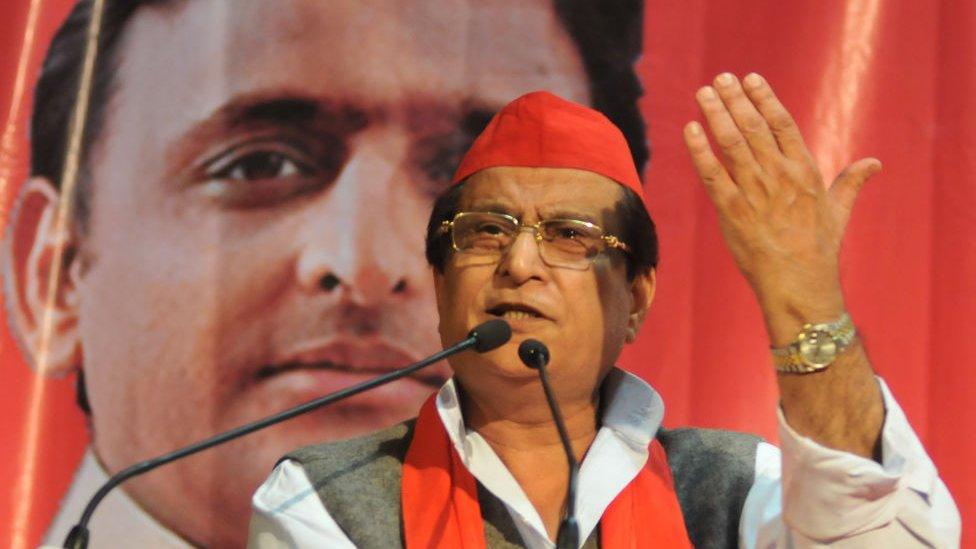
Azam Khan is no stranger to controversy
A police case has been registered against Mr Khan, who is from the Samajwadi Party (SP) - a regional force in the bellwether state.
But he has denied that he was referring to Ms Jaya Prada. He said he was referring to a man.
Why does this matter?
Mr Khan has a reputation for courting controversy.
In 2014, he was banned from addressing any rallies in Uttar Pradesh after the election commission found him guilty of making communally divisive remarks.
But this, many observers say, is a new low and proof of the casual misogyny female politicians continue to encounter in India although women leaders play a big role in many political parties.
His remarks, reportedly made at a rally on Sunday, quickly drew ire from opposition politicians and other observers. The National Commission for Women also took note, with chairperson Rekha Sharma calling it "disgraceful" and saying she would ask the Election Commission to bar him from contesting.
Allow X content?
This article contains content provided by X. We ask for your permission before anything is loaded, as they may be using cookies and other technologies. You may want to read X’s cookie policy, external and privacy policy, external before accepting. To view this content choose ‘accept and continue’.

Ms Jaya Prada unfortunately, is not a stranger to such remarks from male politicians. Firoz Khan, another SP leader, had earlier likened her to a dancer who would entertain the people of Rampur with her "moves" and make campaigning "colourful".
She especially attracts nasty comments from SP leaders because she used to be a member of the party. Possibly because they see her as a formidable opponent - she won the Rampur parliamentary seat in both 2004 and 2009.

How do you vote in the election?
Here's a video explaining everything that happens inside a polling station - and what happens to your vote after that:
Journey of a vote

Coverage from previous weeks:


- Published26 September 2018

- Published10 April 2019
- Published2 April 2019
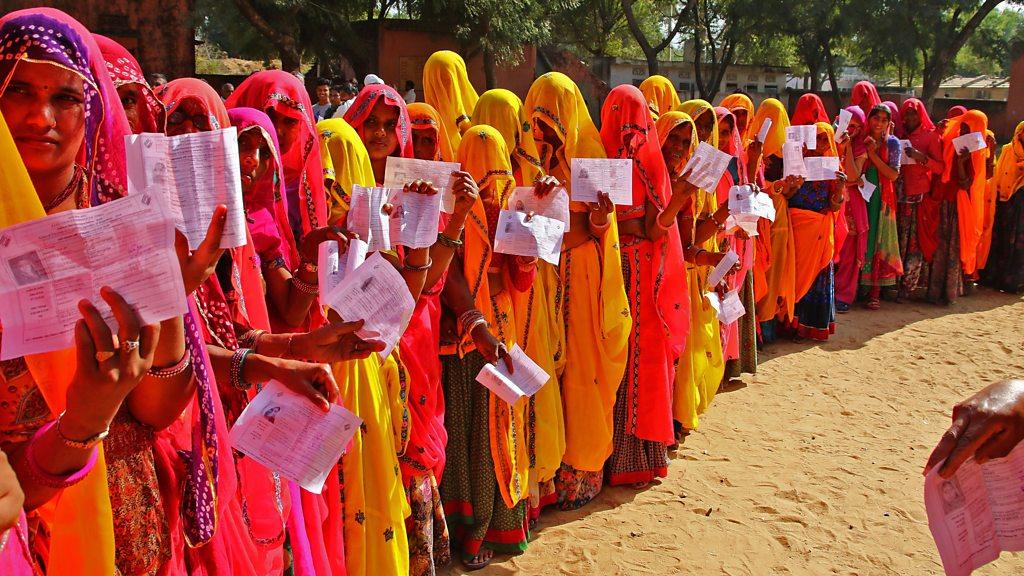
- Published22 May 2018
- Published8 June 2017
- Published11 March 2019
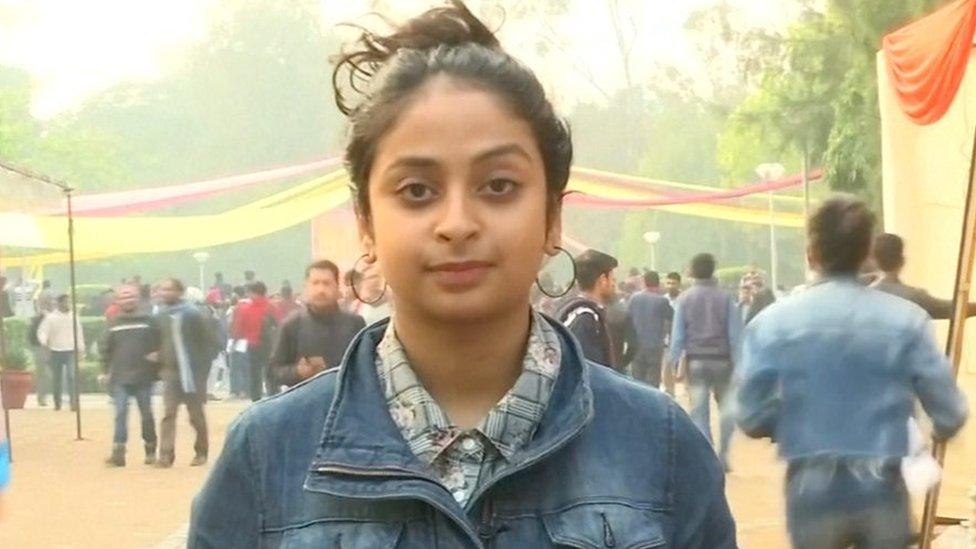
- Published18 March 2019
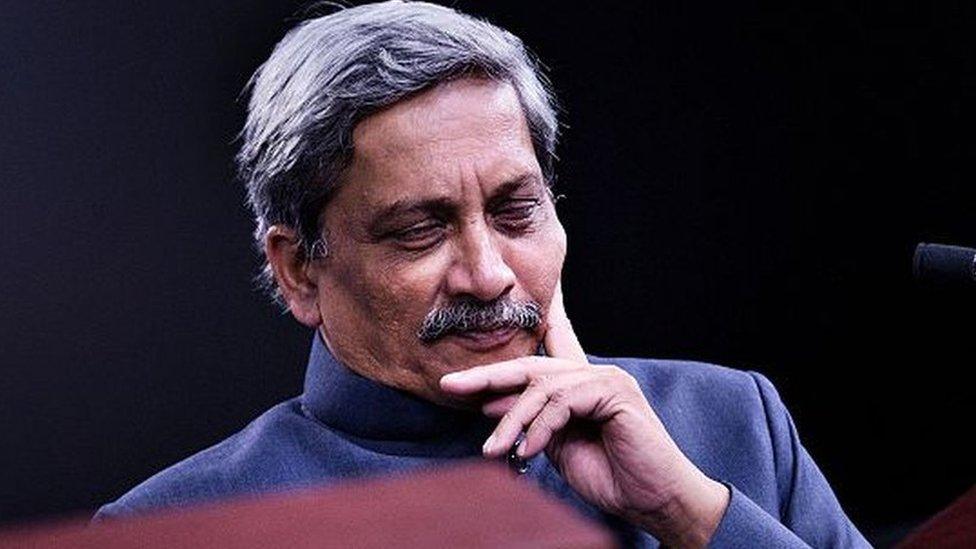
- Published12 December 2018
- Published20 March 2019
